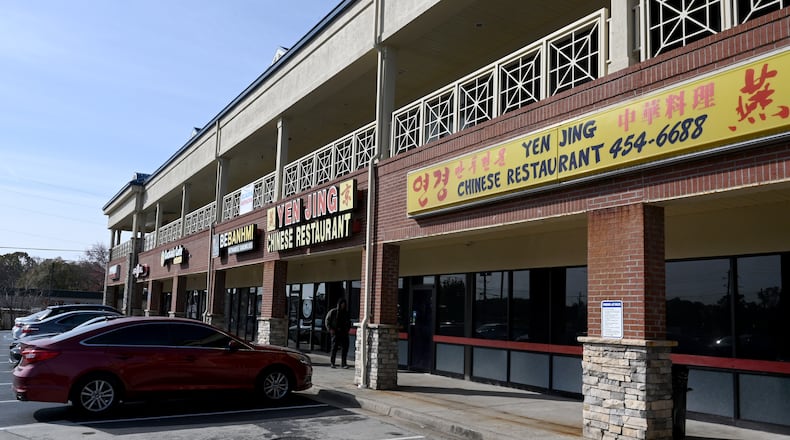In the hours after President Donald Trump announced an additional 10% tariff on Chinese goods, Maggie Mers started making phone calls.
Mers is the founder and CEO of MBM International Logistics, a cargo transportation company based in Atlanta. She’s been on the phone with importers from China this week to discuss shipments impacted by the new tariff, which went into effect Tuesday.
“We’re working double, triple our time to try to do the best we can since this happened,” she said. “I have not really slept, and today, I feel like a zombie. We do the best we can with what we can.”
Local businesses are bracing for higher costs after Trump levied a 10% tariff on Chinese goods. He described it as an “opening salvo” in a trade war with China that he also waged in his first term, an effort partly aimed at stemming the flow of fentanyl from China into the U.S.
The tariffs are also meant to push overseas manufacturers to build factories here and as a cudgel to enact more advantageous trade deals, Trump has said.
Compounding the concern for those who purchase products from China, the U.S. Postal Service announced Tuesday it would no longer accept parcels from China and Hong Kong. The agency then quickly reversed its decision a day later with no explanation.
“The USPS and Customs and Border Protection are working closely together to implement an efficient collection mechanism for the new China tariffs to ensure the least disruption to package delivery,” USPS said in a statement.
Trump’s executive orders also consist of scrapping a customs exception that allowed smaller-value packages from China to enter the U.S. without paying tax.
He also proposed sweeping tariffs on Canada and Mexico, which he delayed for one month after both countries agreed to help block drug smuggling and illegal immigration.
The U.S. tariff on goods from China along with the end of the customs exception for smaller-value packages is expected to increase prices on a broad range of products American consumers buy, ranging from the ultracheap apparel sold on online shopping platforms to toys and electronic devices such as computers and cellphones, according to The Associated Press.
The uncertainty about what Trump’s trade move means for businesses with ties to China has increased anxiety among local restaurant and business owners, who are worried about operating costs and having to raise prices for consumers, said Lani Wong, chair of the National Association of Chinese-Americans' Atlanta chapter.
“We have so many Asian restaurants in the metropolitan area, and they need imports coming in, like kitchen equipment and frozen food, which means restaurant-goers will probably see an increase in menu (prices),” Wong said. “Everyone is assessing (the situation) to see how it is going to affect the consumers. Are people going to stay home and eat out less? We don’t know.”
Ching Hsia, a longtime Chinese restaurant owner whose Doraville eatery closed during the COVID-19 pandemic, said the tariff on Chinese goods will only make it more difficult for Chinese restaurants to operate. She said the ripple effect will gradually make it harder for businesses that need supplies and ingredients from China, particularly mom-and-pops.
“Higher costs from suppliers will make the goods hard to obtain and availability of them not as flexible like before,” she said. “While having to increase the menu prices, it’ll lead to customers not wanting to dine out (as) frequently as before because they also need to save money for high cost goods.”
Hsia intimately knows the struggle of operating a Chinese restaurant under the pressures of inflation and increased levels of anti-Asian rhetoric during Trump’s first term.
“Businesses will become more competitive, fighting with each other to survive,” she said.
For other Atlanta-based entrepreneurs with operations largely based in the U.S., the China tariff could give them a leg up against competitors who rely on Chinese imports, said Maïré Bavarday-Rosa, co-founder and CEO of e-commerce logistics hub ECOMSPACES.
“This could be good news for us, in the U.S., as the consumers might buy more within the U.S. instead, and boost sales for our U.S. brands,” she said.
Regardless of which companies benefit from the tariff, the consumers will ultimately be the ones paying the price, Bavarday-Rosa said.
For Mers, who is also the president of the National Association of Chinese-Americans, Trump’s new tariff is just the latest in a string of obstacles that her international logistics company has had to overcome in recent years, from previous tariffs imposed on Chinese products to the dockworker strike that temporarily shuttered the Georgia Ports Authority’s docks in Savannah last fall.
The key to survival is to weather the storm, she said.
“Time will tell,” Mers said. “The businesses still need to survive, and we’ve still got employees, families to take care of, so we do what we can.”
About the Author
Keep Reading
The Latest
Featured




